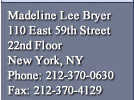|
|
|
|
 |
 Elder Abuse Elder Abuse
Elder abuse is a serious and growing problem in our nation. The American Psychiatric Association estimates that 2.1 million older Americans every year are victims of physical, psychological, or other forms of abuse and neglect. For every case of elder abuse and neglect reported to authorities, experts estimate that there may be as many as five cases not reported. Moreover, the Department of Justice estimates that seniors 80 years and over are abused at two to three times the rate of all other senior citizens
In New York, Section 2803-c of the Public Health Law, which was enacted in response to repeated nursing home abuse scandals in the 1970s, contains a bill of rights for nursing home patients. Among the important rights contained in this law are (1) religious freedom; (2) the right to present grievances to the hospital; (3) the right to receive adequate medical care and be fully informed concerning his or her condition; (4) respectful care and treatment; (5) medical privacy; (6) the right to be free of abuse and/or unnecessary physical and chemical restraints; and (7) the right to receive visits from family and adult friends.
The State Department of Health has also issued regulations that improve the rights of patients in nursing homes. For instance, nursing homes are required to ensure that their patients' abilities of daily living – i.e., the ability to eat, speak, move, bathe, dress and groom – do not diminish unless the patient's medical condition makes it absolutely unavoidable. In other words, nursing homes may not simply warehouse and neglect their patients and watch them deteriorate. Instead, they must take action to ensure, as much as possible, that the patients remain as functional as when they came in.
The regulations also require that patients be provided with proper treatment and assistive devices (such as glasses and hearing aids) to maintain their vision and hearing, that they be given adequate nutrition suited to their medical needs, that they not be drugged simply to make them easier to manage, and that their special medical needs be cared for. In addition, the nursing home must take action to prevent pressure sores – always a serious threat where elderly bedridden patients are concerned – and must promptly treat such sores if they occur.
These rights can be enforced by patients through Section 2801-d of the Public Health Law, a unique legal provision that allows lawsuits for money damages against any nursing home that violates the rights provided by statute or regulation. Section 2801-d offers several advantages when compared to ordinary negligence or medical malpractice actions. Most importantly, in contrast to ordinary lawsuits where the patient has to prove that the hospital was negligent, Section 2801-d places the burden on the nursing home to prove that it took all reasonable care to prevent the injury from occurring. Moreover, this law requires the hospital to pay the legal fees of a successful patient, and if the nursing home's violation was willful, the patient can also obtain punitive damages.
Courts have allowed lawsuits under Section 2801-d for a variety of patient neglect and abuse. Examples of cases where suits have been allowed to go forward under this law include failure to prevent pressure sores, illness due to unsanitary and insect-infested conditions, bad nutrition, falls caused by the nursing home's failure to provide bed rails, leaving wheelchair-bound patients unattended, and the rape of an unconscious patient by a nursing home employee. The courts have interpreted the law broadly to allow patients to sue for the breach of any of the rights set forth in either a State or Federal law or the regulations of the Department of Health.
Depending on what has happened to the patient, he or she may also be able to sue for common-law negligence or medical malpractice. Each of these claims is subject to different legal requirements and burdens of proof, and such claims often require expert analysis in order to develop. It is important to consult with an attorney if you believe that you or a member of your family may have a claim for medical malpractice or negligence against a nursing home.
However, it is important to remember that, where nursing homes are run by the city, state or other public entity, there are strict deadlines for filing a notice of claim for patient abuse or neglect. Ordinarily, a notice of claim has to be filed against a public nursing home within 90 days. Although the courts allow late notices of claim to be filed in certain circumstances, they have the discretion not to do so, and it's always better not to be in the position of asking the court for permission to sue. Therefore, if you believe that you or a family member has been neglected, abused or otherwise deprived of the rights given to nursing home patients, it is important to seek legal assistance as soon as possible.
If you or someone you know has been a victim of elder abuse, please call the office of Madeline Lee Bryer, P.C. at
(212) 370-0630 for a free consultation.
|
|
|
Attorney Advertising. Prior
Results Do Not Guarantee a Similar Outcome.
Copyright © – Madeline Lee Bryer, P.C. – Attorneys at Law
Serious Injuries, Personal Injury Lawyers, Victims Rights,
Burn Injuries, Lead Poisoning, Burn Injuries, Scald Burns, Violent Crime, Third Degree Burns, Car Accidents,
Wrongful Death, Rape, Sexual Assault, Faulty Designed Products, Medical Malpractice
Website by
Consultwebs.com, Inc. – Law webs for law firms, lawyers
|
|





